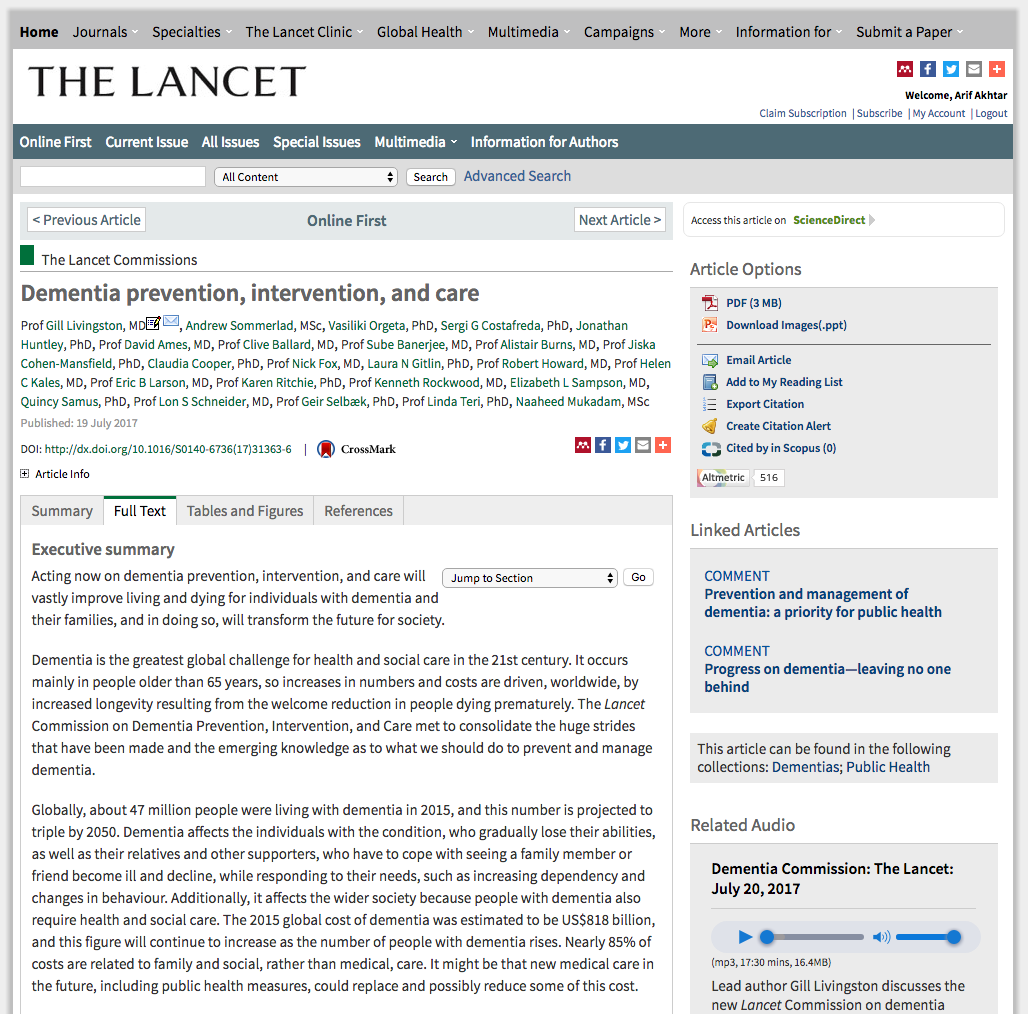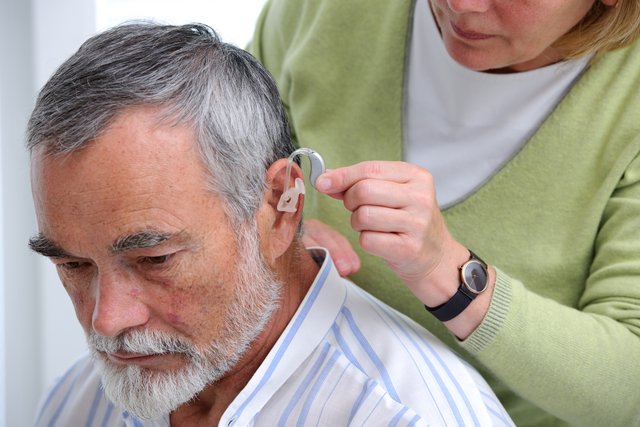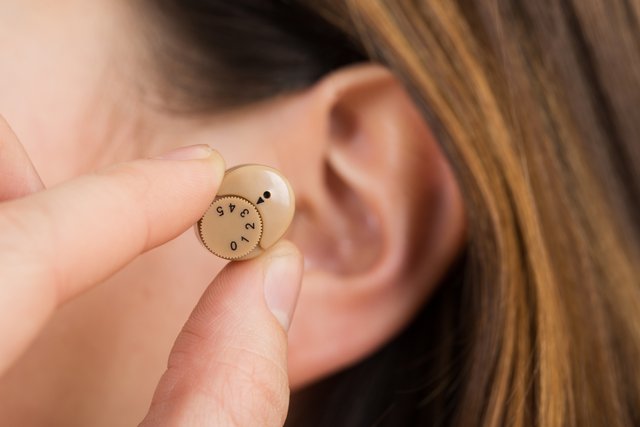Hearing Loss Appears to be a Significant Risk Factor For Dementia

Introduction

A few days ago the Lancet (journal) released its Commission on "Dementia prevention, intervention, and care".
You can download/read the report here for free, although you will need to register and make an account on the Lancet website to do so.
This is basically a huge report which is collated by some of the most esteemed researchers and experts in the field, who then sift through the body of research and try to come up with guidelines and advice.
The report is, as one would expect, very long and contains a lot of information. I am still going through it but one thing I did find of interest was the information linking hearing loss and dementia.
This is a relatively new finding in the dementia field and I think it is something that most people are probably not aware of.
The Findings

The authors of the report were unable to find any systematic reviews or meta-analyses on the subject of hearing loss and dementia.
They therefore examined the literature themselves and looked for:
"high-quality papers as those that had followed a cohort of cognitively healthy people for at least 5 years, had an objective measure of peripheral hearing (pure-tone audiometry), had incident dementia as an outcome, and had adjusted for age and cardiovascular risk factors as potential confounding factors."
They found only 3 studies that met these criteria with follow up varying from 9 to 17 years.
They found a relative risk of 1.9 for hearing loss and dementia which is quite high.
(This means that having hearing loss almost doubles your risk of dementia).
Of even greater interest is a measurement they used called PAF - the Population Attributable Fraction which is 23% for hearing loss.
As they describe the PAF is:
"the percentage reduction in new cases over a given time if a particular risk factor were completely eliminated".
So this would suggest that 23% of new cases of dementia could be eliminated by preventing hearing loss.
This is amongst the highest for all the risk factors and is of particular interest because hearing loss is (in theory at least) preventable and perhaps easier to manage than other factors such as obesity.
Why Would Hearing Loss Cause Dementia?

The exact mechanism is still not understood. There are a number of theories:
There are common mechanisms (e.g. microvascular changes) that cause both dementia and hearing loss.
Hearing loss adds to greater "cognitive load" - further stressing an already overworked brain and leading to greater cell death.
Hearing loss increases social isolation and/or depression which are known to increase dementia risk themselves.
Auditory stimulation itself may have a protective effect against dementia.
It should be noted if point 1 is the main reason for the finding then it would make the process less modifiable or treatable.
The authors discuss this particularly in relation to central and peripheral hearing loss.
(Basically central means involving the brain, whereas peripheral means the inner and outer ear.)
You can potentially modify peripheral hearing loss with a hearing aid but you can't really do anything (as far as I know) for central hearing loss.
Obviously the best way to actually prevent hearing loss is to reduce exposure to loud noise and hence damage to the auditory components of the ear (particularly the cochlear hair cells).
Once it is established and the damage is done it is not reversible, but depending on the exact mechanism of how it relates to dementia, a hearing aid might be the next best thing.
This also brings us to one of the central problems in relation to hearing loss and dementia - i.e. the limited amount of research.
The Problem
As the authors of the commission report point out there is very little research in this field - possibly due to the fact that it is not widely known.

Further research is need to establish true causality i.e. that:
Hearing loss does in fact cause/contribute towards developing dementia (i.e. we are not just looking at correlation).
Hearing modification (e.g. hearing aids) can actually prevent or delay onset of dementia.
Right now we just don't have the research to confirm this.
Conclusion
Please check out the Lancet report if you have an interest in dementia.

It is 62 pages but the most important information is contained in the 2 page summary at the start.
I think these issues are important to consider for the whole of society.
In 2015 there were estimated to be about 47 million people living with dementia, the figure is expected to be 131 million by 2050!
Society is already struggling to look after these cases and such a huge rise will cripple most social and healthcare systems, not to mention the immense toll it will take on patients and their families.
It is therefore immensely useful to know what we can do to prevent this.
References
- Livingston, Gill, Andrew Sommerlad, Vasiliki Orgeta, Sergi G. Costafreda, Jonathan Huntley, David Ames, Clive Ballard, et al. 2017. “Dementia Prevention, Intervention, and Care.” The Lancet, July. Elsevier. doi:10.1016/S0140-6736(17)31363-6.
Thank you for reading


Thank you for sharing this. My grandmother is getting dementia so Im reading up on stuff. She, in fact cant hear that good anymore too so this research might be very interesting. I'm gonna read up on this. Again, thanks for sharing!
You're welcome. I'm really sorry to hear about your grandmother.
Thank you. Well it's old age as well. So we can only do our bests to make it more comfortable for everyone. These reports might help on getting to understand it and how to 'work' with it.
Yes that is the tough part of it. Nobody ever expects to get old I suppose even though it is inevitable it kind of creeps up on everyone.
Yes exactly that. It always creeps up on you and you notice it when it's a bit too late. Such a shame :(
Well hopefully we can stave off the effects for longer with more research and better health.
There are many types of dementia: Alzheimers disease, vascular dementia, dementia with Lewy bodies, frontotemporal dementia. Thus, there are many neurodegenerative mechanistic pathways that end up with 'dementia'. There are also many types of hearing loss. But most dementia types and most hearing loss are age related. I would say that both dementia and hearing loss in general are symptoms of a neurodegeneration (an ageing brain). I do not at all buy the hypothesis that you can prevent dementia by preventing hearing loss.
That is quite possible and why we need more research.
The biggest thing that promotes dementia is a very controversial one. It's when the elderly stop working/solving problems, the low-stress environment accompanied by the lack of social interaction will degrade cognitive ability. Hearing loss can even worsen the situation. So please get your elderly doing stuff, they are very able to, want to do things and they don't want to chill out all the time.
Absolutely - in fact stopping working doesn't just promote dementia it also seems to lead to increased mortality in general. I suspect social isolation and depression are involved.
Thanks for sharing this information. Researchers at the recent Alzheimer's Association International Conference also presented results of a study that demonstrated how comparing short speech samples taken two years apart helped identify early signs of mild cognitive impairment. I recently posted results of research at the University of Florida showing how decline in the ability to smell could be used to identify early dementia. Seems like all our senses may be linked to dementia, either contributing to its onset or valuable in recognizing its onset.
Thanks! Yes it is quite likely.
I think a good first step would be to determine the rate of people suffering from the onset of dementia who have not experienced significant hearing loss as well as the rate of people suffering hearing loss that did not also see the onset of dementia.
Studies which only look for correlative factors will only ever find correlative factors.
Maybe the first step should be to file a grant proposal?
I was thinking to make the same comment but you pretty much covered me up
Great minds... inspire squirlz to think outside the box.
I think it will start happening now that the association has been found but decent research takes time - particularly with dementia. I would suggest follow up studies would be better to look at cause and effect, as well as treatment vs non treatment groups but it all helps.
My father just turned 84, he suffers from Type 1 diabetes (formerly type 2) and has significant hearing loss. His hearing aids help but the biggest improvement in his cognitive abilities (i.e. brain fog, forgetfulness, etc.) has come from his recent diagnosis of pernicious anemia and simple B12 injections.
Well even slight issues can cause pseudo dementias in the elderly and certain deficiencies can cause reversible dementias (if treated in time).
I think more emphasis should be made towards stating up-front in clinical studies, who funded the studies.
I've watched both of my parents' health deteriorate as they've been prescribed various pharmaceutical cocktails. I can't help but wonder if they would have been better off, living with that first condition instead of being prescribed more and more drugs to combat the side effects of the previous drugs.
Not to mention the cancers they've both developed, as known side effects of the drugs they were prescribed.
I mention this because of a post by @anonymous about Google funding the authoring of study after study that demonstrated that Google was operating within the framework of legal and ethical behavior.
The authors just kept forgetting to mention the money they got from Google for their scholarly work.
Yes it is a big problem particularly when it is undeclared!
I have also seen many reports that the lack of smell is also a major signal of problems to come. I will find the research and post later, be sure to follow me if interested
Yes I have heard that too. It is called anosmia.
thanks, and it is on my radar for more research
Thanks for sharing much valuable research paper and good insights...
Although proper clinical trials need to be done inorder to derive a proper relationship between the two (if any). However the research paper can't be altogether wrong....May be The centre of hearing in the brain Auditory Centre is closely related (located in proximity) to the Memory center and damage or death of cells in one center may cause damage to the other center.
In addition the social life altered by the Hearing loss and Depression may also add to the damage.
Great points.
Not exactly - the main auditory cortex is towards the outer part of the brain and the main structure related to memory (hippocampus) is much deeper but it is a good line of thought.
There may well be strong connections between the two that have an enhancing and reinforcing effect.
Wow, it makes sense but I never knew that purely your hearing fading can have a detrimental effect on the chances of you getting dementia.
I thought it was mostly based on the fact if they do lose their hearing they are at a greater risk of being in isolation and solitude which would have some drastic mental effects but I never knew that hearing loss and dementia were intertwined by microvascular changes.
I'll probably start wearing earphones less just to slow down the rate of my hearing decaying as well as when my hearing does being to fade it looks like the best route to take is to have hearing aids.
Thank you for this really useful article @thecryptofiend and I hope it not only helps me but others to live a better life by being aware what circumstances can reduce dementia taking its toll.
I think that is a really good idea because hearing loss is caused by cumulative noise exposure - loud headphones are one of the worst culprits (in the modern world at least). Even if it turns out that hearing loss does not directly cause dementia you will still be preserving your hearing which will improve your quality of life.
Hmmmm... Maybe hearing loss causes an individual to miss out on hearing information that is relevant, therefore rendering the person unable to act accordingly. It may not be a cognitive impairment but a lack of pertinent information.
Could be but I don't think that would skew the results in follow up studies.
I'm sure you're right... just a thought!
It's such a scary illness but if hearing is related then it's good to know we can take another positive step to preventing it by trying to limit our exposure to loud noises at least in the home.
Yes and it would be useful to know if hearing aids could also be helpful.